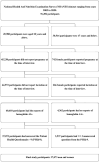Diabetes Control Status and Severity of Depression: Insights from NHANES 2005-2020
- PMID: 39457589
- PMCID: PMC11504683
- DOI: 10.3390/biomedicines12102276
Diabetes Control Status and Severity of Depression: Insights from NHANES 2005-2020
Abstract
Background/Objectives: Examining the risk of depression among patients with diabetes is crucial for understanding the mental health burden of this chronic condition. This study examined the likelihood of depression severity among participants in the National Health And Nutrition Examination Survey (NHANES) from 2005 to 2020, based on glycemic control status. Methods: Depression severity was categorized into three levels using the Patient Health Questionnaire-9 (PHQ-9), and glycemic control status was categorized into five groups based on prior diabetes diagnoses and hemoglobin A1c (HbA1c) levels. Using multinomial logistic regression models, the odds ratio (OR) and 95% confidence intervals (95%CIs) of various severities of depression by glycemic control status were calculated after comprehensive adjustments. Results: Out of 76,496 NHANES participants from 2005 to 2020, 37,037 individuals who met our inclusion criteria were analyzed. The likelihood of depression in individuals with prediabetes was not significantly different from those with normoglycemia. In contrast, participants with diabetes had a higher likelihood of having depression versus individuals with normoglycemia even when they kept their HbA1c within the normal range (lower than 5.7%). Among individuals with diabetes, those with HbA1c < 5.7% had a higher likelihood of mild depression (OR: 1.54, 95%CI: 1.02-2.34), while having HbA1c ≥ 10.0% was significantly associated with a greater likelihood of moderate to severe depression (OR: 1.53, 95%CI: 1.07-2.19) compared to those with HbA1c levels of 5.7-10.0%. Conclusions: Our findings highlight the need for a holistic approach to diabetes care that includes mental health considerations, especially for those who are at the extremes of the HbA1c spectrum.
Keywords: HbA1c; NHANES; blood glucose control; depression; diabetes; mental health; prediabetes.
Conflict of interest statement
The authors declare no conflicts of interest.
Figures


References
-
- Lindekilde N., Nefs G., Henriksen J.E., Lasgaard M., Schram M., Rubin K., Rutters F., Kivimaki M., Pouwer F. Psychiatric Disorders as Risk Factors for the Development of Type 2 Diabetes Mellitus: An Umbrella Review Protocol. BMJ Open. 2019;9:e024981. doi: 10.1136/bmjopen-2018-024981. - DOI - PMC - PubMed
LinkOut - more resources
Full Text Sources
Miscellaneous

